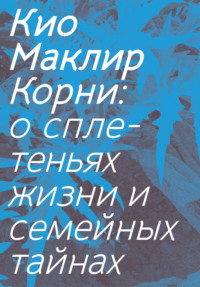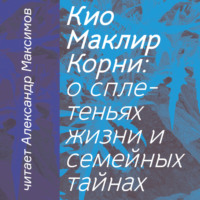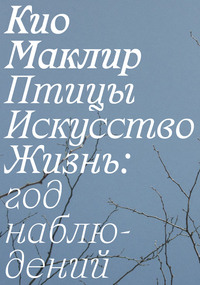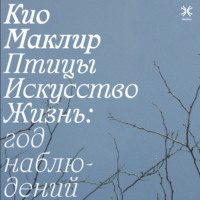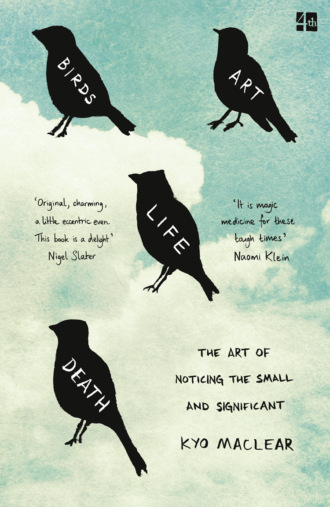
Полная версия
Birds Art Life Death: The Art of Noticing the Small and Significant

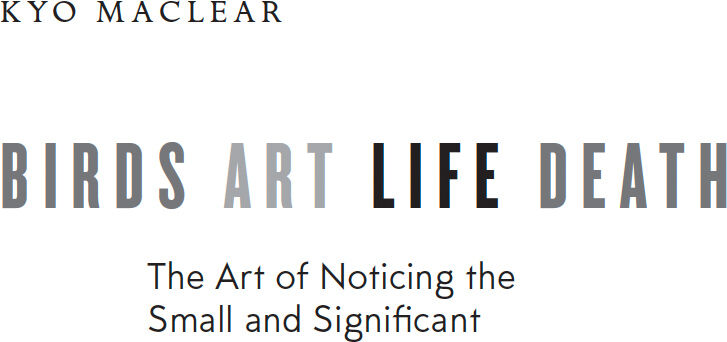

Copyright
4th Estate
An imprint of HarperCollinsPublishers
1 London Bridge Street
London SE1 9GF
www.4thEstate.co.uk
First published in Great Britain by 4th Estate in 2017
First published as Birds Art Life in Canada by Doubleday Canada, a division of Penguin Random House Canada Limited in 2017
First published as Birds Art Life in the United States by Scribner, a division of Simon & Schuster, Inc in 2017
Copyright © Kyo Maclear 2017
By association with Westwood Creative Artists Ltd.
Illustrations (interior and jacket): Kyo Maclear
Photography: Jack Breakfast (www.smallbirdsongs.com), unless otherwise indicated
Map: Jennifer Griffiths
Book design: CS Richardson
The right of Kyo Maclear to be identified as the author of this work has been asserted by her in accordance with the Copyright, Design and Patents Act 1988
A catalogue record for this book is available from the British Library
All rights reserved under International and Pan-American Copyright Conventions. By payment of the required fees, you have been granted the non-exclusive, non-transferable right to access and read the text of this e-book on screen. No part of this text may be reproduced, transmitted, down-loaded, decompiled, reverse engineered, or stored in or introduced into any information storage and retrieval system, in any form or by any means, whether electronic or mechanical, now known or hereinafter invented, without the express written permission of HarperCollins.
Source ISBN: 9780008225049
Ebook Edition © 2018 ISBN: 9780008210014
Version: 2017-11-06
Dedication
For David
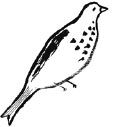
Epigraph
Someone has put cries of birds on the air like jewels.
ANNE CARSON

Contents
Cover
Title Page
Copyright
Dedication
Epigraph
Map
WINTER
Prologue
December: Love
January: Cages
February: Smallness
SPRING
March: Waiting
April: Knowledge
May: Faltering
SUMMER
June–July: Lulls
August: Roaming
AUTUMN
September: Regrets
October: Questions
November: Endings
WINTER
December: Epilogue
Acknowledgements
Permissions
About the Publisher
Map
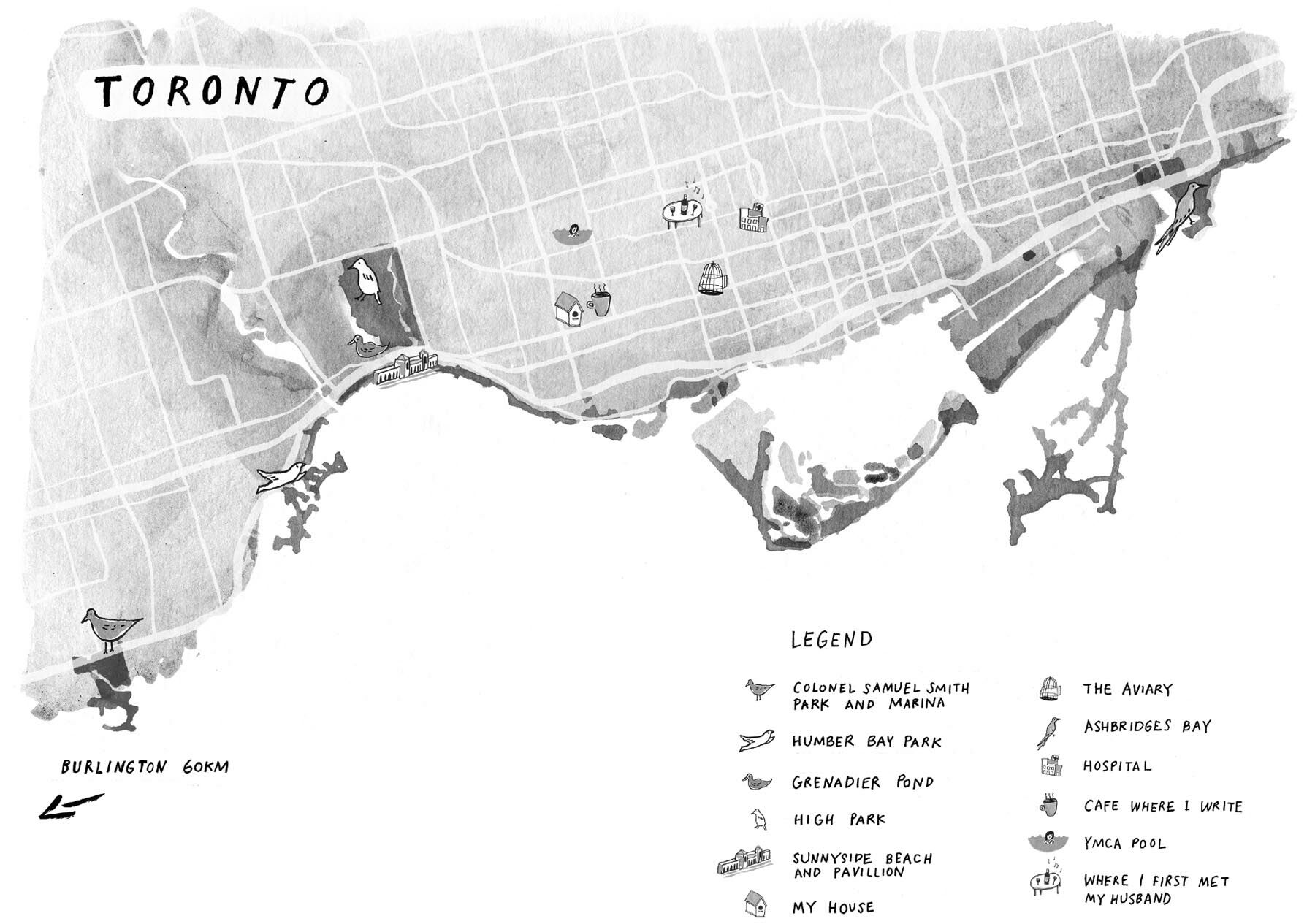

PROLOGUE
On facing a father’s illness
and finding that grief takes strange forms,
including wanderlust.
One winter, not so long ago, I met a musician who loved birds. This musician, who was then in his mid-thirties, had found he could not always cope with the pressures and disappointments of being an artist in a big city. He liked banging away on his piano like Fats Waller but performing and promoting himself made him feel anxious and depressed. Very occasionally his depression served him well and allowed him to write lonesome songs of love but most of the time it just ate at him. When he fell in love with birds and began to photograph them, his anxieties dissipated. The sound of birdsong reminded him to look outwards at the world.
That was the winter that started early. It snowed endlessly. I remember a radio host saying: “Global warming? Ha!” It was also the winter I found myself with a broken part. I didn’t know what it was that was broken, only that whatever widget had previously kept me on plan, running fluidly along, no longer worked as it should. I watched those around me who were still successfully carrying on, organizing meals and careers and children. I wanted to be reminded. I had lost the beat.
My father had recently suffered two strokes. Twice—when the leaves were still on the trees—he had fallen and been unable to get up. The second fall had been particularly frightening, accompanied by a dangerously high fever brought on by sepsis, and I wasn’t sure he would live. The MRI showed microbleeds, stemming from tiny ruptured blood vessels in my father’s brain. The same MRI revealed an unruptured cerebral aneurysm. An “incidental finding,” according to the neurologist, who explained, to our concerned faces, his decision to withhold surgery because of my father’s age.
During those autumn months, when my father’s situation was most uncertain, I felt at a loss for words. I did not speak about the beeping of monitors in generic hospital rooms and the rhythmic rattle of orderlies pushing soiled linen basins through the corridors. I did not deliver my thoughts on the cruelty of bed shortages (two days on a gurney in a corridor, a thin blanket to cover his hairless calves and pale feet), the smell of hospital food courts, and the strange appeal of waiting room couches—slick vinyl, celery green, and deceptively soft. I did not speak of the relief of coming home late at night to a silent house and filling a tub with water, slipping under the bubbles and closing my eyes, the quiet soapy comfort of being cleaned instead of cleaning, of being a woman conditioned to soothe others, now soothed. I did not speak about the sense of incipient loss. I did not know how to think about illness that moved slowly and erratically but that could fell a person in an instant.
I experienced this wordlessness in my life but also on the page. In the moments I found to write, I often fell asleep. The act of wrangling words into sentences into paragraphs into stories made me weary. It seemed an overly complicated, dubious effort. My work now came with a recognition that my father, the person who had instilled in me a love of language, who had led me to the writing life, was losing words rapidly.
Even though the worst of the crisis passed quickly, I was afraid to go off duty. I feared that if I looked away, I would not be prepared for the loss to come and it would flatten me. I had inherited from my father (a former war reporter/professional pessimist) the belief that an expectancy of the worst could provide in its own way a ring of protection. We followed the creed of preventive anxiety.
It is possible too that I was experiencing something known as anticipatory grief, the mourning that occurs before a certain loss. Anticipatory. Expectatory. Trepidatory. This grief had a dampness. It did not drench or drown me but it hung in the air like a pallid cloud, thinning but never entirely vanishing. It followed me wherever I went and gradually I grew used to looking at the world through it.
I had always assumed grief was experienced purely as a sadness. My received images of grief came from art school and included portraits of keening women, mourners with heads bowed, hands to faces, weeping by candlelight. But anticipatory grief, I was surprised to learn, demanded a different image, a more alert posture. My job was to remain standing or sitting, monitoring all directions continually. Like the women who, according to legend, once paced the railed rooftop platforms of nineteenth-century North American coastal houses, watching the sea for incoming ships, hence earning those lookouts the name widow’s walk. I was on the lookout, scouring the horizon from every angle, for doom.
It was only later, when I read C. S. Lewis’s A Grief Observed, that I understood grief’s many guises and iterations. “No one ever told me that grief felt so like fear … Perhaps, more strictly, like suspense,” Lewis wrote. “Or like waiting; just hanging about waiting for something to happen. It gives life a permanently provisional feeling. It doesn’t seem worth starting anything. I can’t settle down.”
The grief I felt was not upending my life. It did not, for instance, prevent me from socializing and exercising and tracking down orange blossom water for a new cake recipe. It did not prevent me from lying in corpse pose in a crowded yoga studio, simulating my own proximity to the void. But it unmoored me and remained the subtext of my days.
One night I looked in the mirror and noticed my eyebrows were aloft. I tried to relax my face, make my brows those of a different, more carefree person. The next day, while sitting on the streetcar, I watched a woman whose eyebrows had been carefully pencilled in and thought how cartoonishly worried she looked with those skinny, fretful arcs. Like me, I thought, like everyone.
The worry was heavy and I tried to put it down. I tried to read my way out of it. I tried to distract myself from it. I tried to write my way through it. Ordinarily my art could withstand the pressures of life, the demands of young children and aging parents. But that year when the snow came early I discovered I had a wan and flimsy art, one that could be smacked down like a cheap sidewalk sign with the slightest emotional gust.
Or maybe I discovered something more fundamental: worry is a constriction. A mind narrows when it has too much to bear. Art is not born of unwanted constriction. Art wants formless and spacious quiet, anti-social daydreaming, time away from the consumptive volume of everyday life.
My relationship to time, my attitude towards it, grew fickle. I wanted an expanse of it. I wanted just a little. It moved too quickly. It crept too slowly. It was overly determined by forces outside myself. It overwhelmed me if I was left to define its shape. It was best late at night after my village slept. It was only good in the very early morning before the village awoke and the hours and minutes were set.
I had grown so accustomed to being interrupted by emergency calls and hospital news, I began interrupting myself whenever I sat down to work. I leapt up from my seat every half-hour as though an alarm had sounded. Time used to be deeper than this, I thought.
I studied the eyebrows of writers and artists I respected. I researched famous eyebrows. Frida. Audrey. Greta. Groucho. “Brows may be a map of the psyche,” reported one fashion magazine. I looked for the secret recipe (impeccable elegance, theatrical boldness, unkempt creativity, flirty merriment) that fed people and made them flourish. I wanted a road map back to my art and equanimity.
One morning while standing at a café counter staring at the magnificently thick brows of the man making my coffee, I discovered one should not gaze too long at faces unless one is prepared to fall in love again. As I watched the warm air of the coffee machine steam his eyeglasses, as I noticed him squint behind the fog, as he made a flower pattern in the foam of my coffee, I felt overcome with love. Faces have a near-unwatchable intimacy, particularly in a world in which everything perishes in the end. It is difficult to look as we choose, without emotional consequence.
Like me, the man looked very tired. What had he lost? What was he about to lose? Was he trying to get his grieving done ahead of schedule?
A few days later, I was charmed by a man at the gym and the thoughtful way he wiped down the treadmill for me. I was charmed by a chiropractor and the way my body flooded with endorphins when he leaned into his adjustment. I was charmed by the kindness of a stranger who let me slip in front of her at the grocery checkout. The professor, the café manager, the dog walker—I ran away with each of them in my mind, and this scared me because I come from a long line of philanderers. “Be careful,” whispered the guardian angel on my shoulder. “Remember how much you love your husband.”

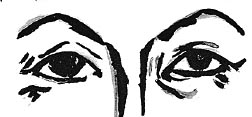
“Eybrows perpetually slightly raised” (Anne Carson)

“The original queen of bold brows” (Audrey Hepburn)

Arching “his eyebrows about ten degrees” (Buster Keaton)
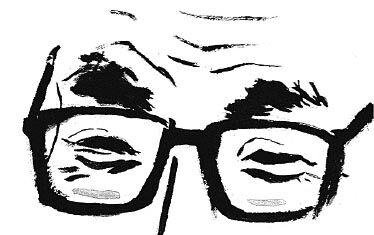
“Thick, black, expressive eyebrows” (Hayao Miyazaki)
I knew in my heart that I didn’t want to fall in love with another person. I wanted to fall in love with something bigger. Something that would hold me and my wandering mind. Something, like a love affair, that would allow me to say: I am here, I am alive. I am doing more than calmly bracing myself.
It was not enough to be a vigil flame, contained and burning around the clock.
As my days became increasingly plotted, I developed a bad case of wanderlust (Ger. wandern, to hike, and lust, desire).
I began to envy the literal wanderers, the ones out in the dark seas, or breaking away to hike up mountains and along the Pacific Crest trail. I dreamt of following footprints on a path, of going where the wild things are. But I had never been a Great Outdoors traveller. I was an urban person, a city-identified post-colonialist. The thought of pointing and gasping at something spectacularly beautiful on a warming planet felt dismal. Such was my state of mind. The feeling of pre-grief had made a home in my body. The shadow of an ending in my own family had made me alert to other endings.
Death is the definition of finitude. My wanderlust, I began to feel, was about finding my way back to infinity, back to the woods of a creative and contemplative mind.
I dreamt again of footprints on a path and realized when I awoke that it was not escape that I craved but guidance. For weeks, I sought instruction wherever I went. Please, YMCA lifeguard, will you coach me on my freestyle? Please, elaborately coiffed greengrocer, can you tell me how to cook these bitter greens? I wanted gifts of knowledge. I wanted company.
I wanted someone to lead the way forward and keep me going. Not a saviour but a guiding force. I was ready to imprint myself like a duckling.
I contacted a well-known artist to discuss the possibility of drawing lessons. As a child, I used to draw all the time. It absorbed me completely. At some point, writing replaced drawing and what had once been second nature (drawing) became foreign. But the urge to draw had remained. I missed its simple and primordial pleasures. The artist met me at a café wearing a black parka and a delicate grey-blue scarf and appeared doubtful that she was in the right place, even after I introduced myself. When she ordered a small chai, I ordered the same, companionably affirming her choice. When she straightened her spine, I instinctively did the same. When she asked me why I wanted her to teach me drawing, I replied, “Sometimes you just want to sit back and be led.” Realizing this sounded strangely passive and messianic, I added, “Through drawing prompts.” I didn’t want her to think I was looking for a guru or that I was the kind of person who would just hand myself over to someone else. I also did not want her to hear my hunger, because to hunger as much as I did at that moment felt lascivious.
The artist peered at me thoughtfully. Her blue eyes were clear and perfectly lined with kohl. Finally she spoke, with a hint of bemusement. She said the students who came to her were always full of hunger. They were seventeen-year-old aspiring artists and eighty-five-year-old retired businessmen. People of mourned, mislaid, or unmined creativity. Their yearning was like the white puff of a dandelion. All she had to do was blow gently and watch their creative spores lift, scatter, and take seed.
We sat by the window and watched the clods of fresh snow thrown up by the feet of passersby, the uprush of wings when a flock of pigeons startled into the now white winter sky. Angles of light, intensities of shadow, the way the sky clouded and cleared and the streetcars gorged and disgorged passengers. I felt the artist’s full-body noticing and the passing time.
I looked across the street at the signs hanging on the discount store.
DON’T JUST STAND THERE, BUY SOMETHING!
THERE’S NO BUSINESS LIKE SHOE BUSINESS!
FREE 12-PACK OF RACCOONS
FOR EVERY VISITOR!
I knew at that moment I would not pursue private art lessons with this woman who, to be truthful, unnerved me with her quiet concentration and pin-straight posture.
I went home and pulled out my ancient brushes and pen nibs and old bottles of ink. I spent a little time sharpening my drawing pencils and cleaning my stubby grey erasers. I found a block of drawing paper. I looked at the sharpened pencils and for a moment they were arrows. They were arrows pointing to all the things that could not be captured with words, arrows pointing to other possible lives, potentialities, directions, even backtracks. I was waiting to be led by a line, in this case a pencil line.
In that moment of stillness, I realized I might also have been grieving the longer spans of time that allowed me to get a lift out of daily life.
As I sat with those arrows, as illness and caregiving further compressed my days into tiny snippets of moments, I had a growing feeling that my life, with its new shape and needs, required a different, less militant arrangement of time. What if I stopped fighting for the trance of long-form days, where I would be uninterrupted and ambitiously absorbed in a big project? What if I gave myself over to time’s dispersion? Could I value the fractured moments as something more than “sub-time” or lost time or broken time? Could I find a graceful way to work and be in the world that might still pull me up and forward?
I wish I could say that in the weeks and months to come I no longer felt at war with the world, but that was not the case. I am a self-employed writer. It is not easy to stop being unstoppable. (Just ask the pronghorn who continues to outrun the ghost of predators past.) I still tried to protect and fortify myself against invasion from time-looting bandits, still moved through the world as if I were perpetually on-task, trying to focus on nothing but what was in my own head and what I might make.
But I did begin to make peace with my fragments.
December
LOVE

On falling in love with birds and discovering other lessons in insignificance.
Конец ознакомительного фрагмента.
Текст предоставлен ООО «ЛитРес».
Прочитайте эту книгу целиком, купив полную легальную версию на ЛитРес.
Безопасно оплатить книгу можно банковской картой Visa, MasterCard, Maestro, со счета мобильного телефона, с платежного терминала, в салоне МТС или Связной, через PayPal, WebMoney, Яндекс.Деньги, QIWI Кошелек, бонусными картами или другим удобным Вам способом.


